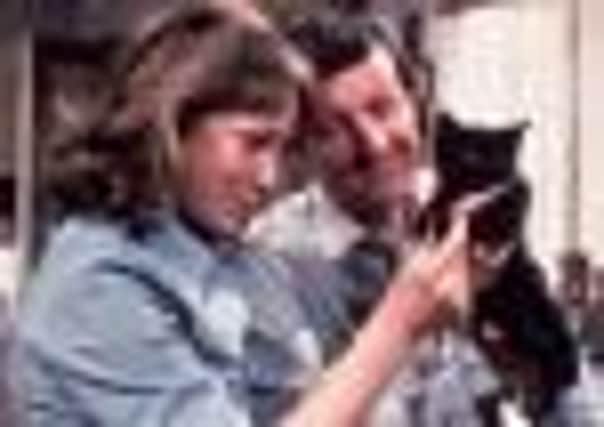Obituary: Richard Briers CBE, popular actor best known for playing cheerful idealist Tom in The Good Life


Richard Briers will forever be associated with Tom Good in The Good Life, which the BBC aired from 1975 to 1978. Tom – the well-meaning, rather naïve chap in Surbiton – had a midlife crisis and opted out of the rat race to become self-sufficient.
The sitcom centred on that simple formula and became a classic. It was conceived as a vehicle for Briers, who was previously better known than his co-stars. He brought to the series a joyous and innocent insouciance that kept the show alive and popular for some 30 years.
Advertisement
Hide AdAdvertisement
Hide AdBriers was joined by an ideal cast (his hard-pressed wife Felicity Kendal and the upper-crust neighbours Penelope Keith and Paul Eddington) and they jointly provided some of the most glorious moments on British television. Whether it was Keith’s bossy Margot laying down the law to the harum-scarum Tom or just another of his crackpot money-saving operations, Briers had the ability to capture the very essence of a scene with a delightful chuckle. And the nation joined in with enthusiasm.
The joint script writer of The Good Life, Bob Larbey, said yesterday: “Richard was a great bloke and a very good friend to everyone. Always smiling and funny. As an actor he was totally unselfish: he loved being part of a team and wanted everyone to share in the success.”
Briers often performed in Scotland and was involved in two Edinburgh Festivals, firstly in 1964 in a new (but largely forgotten) play called Hamp which co-starred John Hurt. More memorably he appeared in 1990 with Kenneth Branagh’s Renaissance Theatre Company in A Midsummer Night’s Dream and King Lear. It was a mammoth undertaking for Briers as he played Bottom in the former and the title role in the latter.
For three weeks his performances were hailed and Allen Wright in The Scotsman ended his review: “Richard Briers was immensely moving as Lear.”
In many ways that visit epitomised the change in Briers as an actor. His years as a renowned comic actor were overtaken by the eminent classical actor who established himself in the most challenging roles in Shakespeare.
Wright remarked how, as the performance of Lear grew, Briers changed from “being a querulous old man… his Lear becomes immensely moving from that moment. It is then that this actor’s immense gifts as a comic actor take over, bringing out the poignancy of the character and his plight.”
Other visits to the Scottish theatres included a role in the comedy Relatively Speaking in 1965. The play helped launch the career of both Briers and Alan Ayckbourn, playing to packed houses at the Kings in both Edinburgh and Glasgow.
But his association with Scotland was heightened when he was cast as the impoverished laird in Monarch of the Glen. Briers always said that he and Hector MacDonald of Glenbogle had much in common. “It suited me. We shared an old-fashioned aversion to the modern world. Both often irascible.”
Advertisement
Hide AdAdvertisement
Hide AdHe did 25 episodes, much enjoying the Loch Laggan area and playing golf on his days off. He thought he looked “rather fetching” in the kilt and furthered his knowledge of the malt: “I have been known to have the occasional sip.”
Many were sad when he left the series to be replaced by none other than Julian Fellowes.
Richard David Briers was educated in West London and after national service in the RAF he studied at London’s Royal Academy of Dramatic Art. He then worked with various repertory companies before making his West End debut.
In 1961 he was cast in his first sitcom, Marriage Lines, opposite Prunella Scales. That was followed by several sitcoms in which he played the put-upon husband, including Brothers-in-Law and The Seven Faces of Jim. Then came The Good Life, the last episode of which was performed in front of the Queen in 1977.
In 1984 he joined Peter Egan in Ever Decreasing Circles and many other television appearances followed, such as the role of a particularly unpleasant Dean in a Morse and a dotty vicar in Midsomer Murders.
He joined Branagh to make several movies – notably playing Polonius in Hamlet – and was a consummate radio actor appearing alongside Stanley Baxter on Radio 4’s Two Pipe Problem and with Michael Horden in Jeeves and Wooster.His work in the theatre continued unabated – only two years ago he was at the National Theatre starring with Simon Russell Beale in Nicholas Hytner’s production of London Assurance.
Briers, who had been a heavy smoker in his youth, was diagnosed with emphysema in 2008. He was a most active ambassador for the Alzheimer’s Society and awarded a CBE in 2003.
But it is The Good Life that lingers in the memory. Briers’ impish smile as he ribs Margot or desperate worry about the flooded carrot beds are part of sitcom history. The 30 episodes are rightly household favourites and are among the most popular sitcoms ever. They are enduring icons of their time and Richard Briers was central to the series’ joy, happiness and good-natured humour.
Briers married the actress Anne Davies in 1956. She and their two daughters survive him.
Alasdair Steven